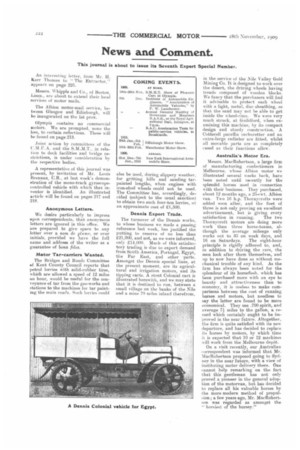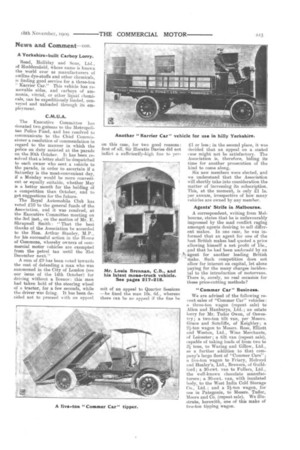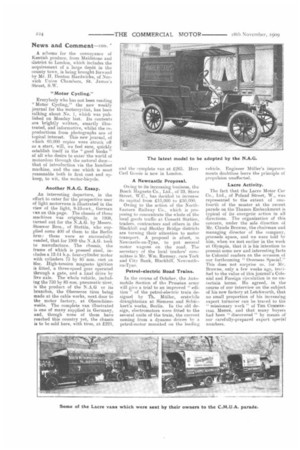News and Comment.
Page 10

Page 11

Page 12

If you've noticed an error in this article please click here to report it so we can fix it.
This journal is about to issue its Seventh Export Special Number.
An intereqcting letter, from Mr. H. Kerr Thomas to " The Extractor," appears on page 225.
Messrs. Whipple and Co., of Boston, Lines., are about to extend their local services of motor mails.
The Albion motor-mail service, between Glasgow and Edinburgh, will be inaugurated on the 1st prox.
Olympia contains no commercial suitors. We are prompted, none the less, to certain reflections. These will be found on page 213.
.Joint action by committees of the C.M.U.A. and the S.M.M.T.. in relation to dock facilities and bridge restrictions, is under consideration by the respective bodies.
A representative of this journal was present, by invitation of Mr. Louis Brennan, CB., at last week's demonstration of the mono-track gyroscopecontrolled vehicle with which that inventor is identified. An illustrated article will be found on pages 217 and 218.
Anonymous Letters.
We desire particularly to impress upon correspondents, that anonymous letters are ignored in this office. We are prepared to give space to any letter over a nom de plume, or over initials, provided we have the full name and address of the writer as a guarantee of bona fides.
Motor Tar-carriers Wanted.
The Bridges and Roads Committee of Kent County Council reports that petrol lorries with solid-rubber tires, which are allowed a speed of 12 miles an hour, would be useful for the conveyance of tar from the gas-works and stations to the machines for tar painting the main roarls. Such lorries could also be used, during slippery weather, for gritting hills and sanding tarpainted lengths, when engines with iron-shod wheels could not be used. The Committee has, accordingly, decided (subject to the usual sanction) to obtain two such four-ton lorries, at an approximate cost of £1,500.
Dennis Export Trade.
The turnover of the Dennis works, to whose business: we made a passing reference last week, has justified the putting to reserve of no less than £21,000, and not, as we were informed, only £14,000. Much of this satisfactory trading is due to export demand from South America, Portugal, Egypt, the Far East, and other parts. Amongst the Dennis special lines, at the present moment, are its agricultural and irrigation motors, and its tipping carts. A stout Colonial cart is illustrated herewith, and we may state that it is destined to run, between a small village on the banks of the Nile and a mine 70 miles inland therefrom,
in the service of the Nile Valley Gold Mining Co. It is designed to work over the desert, the driving wheels having treads composed of wooden blocks. We fancy that the purchasers will find it advisable to protect each wheel with a light, metal, disc sheathing, so that the sand may not be able to get inside the wheel-rims. We were very much struck, at Guildford, it hen examining this machine, by its compact design and sturdy eonstrnction. A Cotterell paraffin carburetter and an extra-large radiator are fitted, whilst all movable parts are as completely cased as their functions allow.
Australia's Motor Era.
Messrs. MacRobertson, a large firm of manufacturing confectioners in Melbourne, whose A I hi on motor we illustrated several weeks hack, have been noted until recently for the splendid horses used in connection with their business. They purchased, about 1`2 months ago, a 25-cwt. Album van. Two 16 lep. Thornycrofts were added soon after, and the fleet of three is not only proving an excellent advertisement, but is giving every satisfaction in running. The two Thornyeroft motors are doing more work than three horse-teams, although the average mileage only works out to 35 on week days, and
16 on Saturdays. The eight-hour principle is rigidly adhered to, and, in addition to driving the cars, the men look after them themselves, and up to now have done so without mechanical trouble of any kind. As the firm has always been noted for the splendour of its horseflesh. which has been purchased more with an eye to beauty and attractiveness than to economy, it is useless to make comparisons between the cost of running horses and motors, but needless to say the latter are found to be more economical. They use .700 spirit, and average 711 miles to the gallon, a. record which certainly ought to be improved in the near future. Altogether, the firm is quite satisfied with its new departure, and has decided to replace its horses by motors, by which time it is expected that 10 or 12 machines will work from the Melbourne depot.
On a visit recently, our Australian correspondent was informed that Mr. MacRobertson proposed going to Sydney in the near future, with a view of instituting motor delivery there. One cannot help remarking on the fact that this gentleman has not only proved a pioneer in the general adoption of the motors-an, but has decided to replace all his valuable horses by the more modern method of propulsion; a few years ago, Mr. MacRobertson was regarded as amongst the " horsiest of the horsey."
A Yorkshire-built Carboy Lorry.
Read, Holliday and Sons, Ltd.. of Huddersfield, whose name is known the world over as manufacturers of aniline dye-stuffs and other chemicals, is finding good service for a three-ton " Karrier Car." This vehicle has removable sides, and carboys of ammonia, vitriol, or other liquid chemicals, can be expeditiously loaded, conveyed and unloaded through its employment.
C.M.U.A.
The Executive Committee has donated two guineas to the Metropolitan Police Fund, and has resolved to communicate to the Chief Commissioner a reaolution of commendation in regard to the manner in which the police on duty assisted at the parade on the 30th October. It has been resolved that a. letter shall be despatched to each owner who sent a vehicle to the parade, in order to ascertain if a Saturday is the most-convenient day, if a Monday would be more convenient or equally suitable, whether May is a better month for the holding of a competition than October, and to get suggestions for the future.
The Royal Automobile Club has voted £10 to the general funds of the Association, and it was resolved, at the Executive Committee meeting on the 3rd inst. on the motion of Mr. E. Shrapnell inst., : "That the best
thanks of the Association be accorded to the Hon. Arthur Stanley, M.P., for his successful action in the House of Commons, whereby owners of commercial motor vehicles are exempted from the petrol tax until the 31st December next."
A sum of .£9 has been voted towards the cost of defending a man who was summoned in the City of London (see our issue of the 14th October) for driving without a licence; this man had taken hold of the steering wheel of a tractor, for a few seconds, while the driver was firing. It has been decided not to proceed with an appeal
on this case, for two good reasons: first of all, Sir Horatio Davies did not inflict a sufficiently-high fine to per
mit of an appeal to Quarter Sessions —he fined the man 10s. 6d., whereas there can be no appeal if the fine he CI or less; in the second place, it was decided that an appeal on a stated case might not be satisfactory. The Association is, therefore, biding its time for another prosecution of the kind to come along_ Six new members were elected, and we understand that the Association will shortly take into consideration the matter of increasing its subscription. This, at the moment, is only £1 Is. per annum, irrespective of how many vehicles are owned by any member.
Agents' Strife in Melbourne.
A correspondent, writing from Melbourne, states that he is unfavourably impressed by the mad conflict raging amongst agents desiring to sell different makes. In one case, he was informed that an agent for one of the best British makes had quoted a price allowing himself a net profit of 15s., and that he had been undersold by an • agent for another leading British make. Such competition does not allow for interest on capital, let alone paying for the many charges incidental to the introduction of motorvans_ There is, surely, no real occasion for these price-cutting methods?
"Commas Car" Business.
We are advised of the following recent sales of "Commer Car" vehicles : a three-ton wagon (repeat sale) to Allen and Hanburys, Ltd. ; an estate lorry for Mr. Tudor Owen, of Oswestry ; a two-ton tilt van, per Messrs. Grace and Sutcliffe, of Keighley ; a 21-ton wagon to Messrs. Ross, Elliott and Weston, Ltd., Wine Merchants, of Leicester ; a tilt van (repeat sale), capable of taking loads of from two to 2i tons, to Waring and Gillow, Ltd., as a further addition to that company's large fleet of "Commer Cars" ; a five-ton wagon to Friary, Holroyd and Healey's, Ltd., Brewers, of Guildford; a 30-cwt. van to Fullers, Ltd., the well-known chocolate manufacturers; a 30-cwt. van, with insulated body, to the West India Cold Storage Co., Ltd. ; and a 24-ton wagon, for use in Patagonia, to Messrs. Tudor, Moore and Co. (repeat sale). We illustrate, herewith, one of this make of five-ton tipping wagon.
A scheme for the conveyance of Kentish produce, from Maidstone and district to London, which includes the acquirement of a large depot in the county town, is being brought forward by Mr. H. Denton Hardwicke, of Norwich Union Chambers, St. James's Street, S.W.
"Motor Cycling."
Everybody who has not been reading " Motor Cycling," the new weekly journal for the motorcyclist, has been talking about No. 1, which was published on Monday last, Its contents are brightly written, smartly illustrated, and inforinative, whilst the reproductions from photographs are of topical interest. This new journal, of which 60,000 copies were struck off as a start, will, we feel sure, quickly establish itself in the " good books " of all who desire to enter the world of motordoin through the natural door— that of introduction via the handiest machine, and the one which is most reasonable both in first cost and upkeep, to wit, the motor-bicycle.
Another N.A.G. essay.
An interesting departure, in the effort to cater for the prospective user of light motorvans is illustrated in the view of the light, 8-10-cwt.., German van on this page. The chassis of these machines was originally, in 1908, turned out for the N.A.G. by Messrs. Stoewer Bros., of Stettin, who supplied some 400 of them to the Berlin firm : these were so successfully vended, that for 1909 the N.A.G. took to manufacture. The chassis, the frame of which is pressed steel, includes a 12-14 h.p. four-cylinder motor with cylinders 75 by 85 nun. east Clb Roc. High-tension magneto ignition is fitted, a three-speed gear operated through a gate, and a final drive by live axle. The whole vehicle, including the 750 by 85 mm. pneumatic tires, is the product of the N.A.G or its branches, the Oberseree tires being made at the cable works, next door to the motor factory, at Oberschoneweide. The complete van illustrated is one of many supplied in Germany, and, though none of them have reached this country yet, the chassis is to be sold here, with tires, at 1225,
and the complete van at £265. Herr Carl Gossie is now in London.
A Newcastle Proposal.
Owing to its increasing business, the Bosch Magneto Co., Ltd., of 23, Store Street, W.C., has decided to increase its capital from £15,000 to £50,000.
Owing to the action of the NorthEastern Railway Cu., which is proposing to concentrate the whole of the local goods traffic at Consett Station, traders, contractors and others in the Rlackh ill atal Shotiey Bridge districts are turning their attention to motor transport. A proposal is afoot, in Newcastle-on-Tyne, to put several motor wagons on the road. The secretary of the local 'traders' committee is Mr. Wm. Ramsay, care York and City Bank, Blackhill, Newcastleon-Tyne.
Petrol-electric Road Trains.
In the course of October, the Automobile Section of tha Prussian army will give a trial to an improved " edition " of the petrol-electric train designed by Th. Miller, erstwhile draughtsman at Siemens and &Inckert's works, Berlin. In the old design, electromotors were fitted to the several units of the train, the current coming from a dynamo driven by a petrol-motor mounted on the lending
vehicle. Engineer Muller's improvements doubtless leave the principle of propulsion unaffected.
Lacre Activity.
The fact that the Lacre' Motor Car Co., Ltd., of Poland Street, W., was represented to the extent of onefourth of the muster at the recent parade on the Thames Embankment is typical of its energetic action in all directions. The organization of this concern, under the sole direction of Mr. Claude Browne, the chairman and managing director of the company, proceeds apace, and we were told by him, when we met earlier in the week at Olympia, that it is his intention to present some new and interesting facts to Colonial readers on the occasion of our forthcoming " Overseas Special." This does not surprise us, for Mr. Browne, only a few weeks ago, testified to the value of this journal's Colonial and Foreign circulation in no uncertain terms. He agreed, in the course of our interview on the subject of his new factory at Letchworth, that no small proportion of his increasing export turnover can be traced to the " missionary work" of THE COMMERCIAL MoTon, and that many buyers had been " discovered " by means of our carefully-prepared export spec; a I numbers.




















